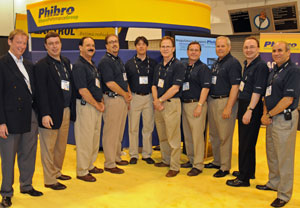 For those of you not familiar with an FDA, Food Additive Petition (FAP), the folks at Phibro Chem’s Ethanol Performance Group can help you understand what it means to ethanol producers. They market the antimicrobial product, Lactrol.
For those of you not familiar with an FDA, Food Additive Petition (FAP), the folks at Phibro Chem’s Ethanol Performance Group can help you understand what it means to ethanol producers. They market the antimicrobial product, Lactrol.
We normally think of the EPA when it comes to governmental regulations in this industry but FDA is getting more involved. That’s why a company like Phibro, with years of experience dealing with the agency because of the animal health side of their business is probably a little ahead of the curve on this.
I spoke with Richard Coulter, VP, Scientific & Regulatory Affairs and Paul Duquette, Director, Global Regulatory Affairs during the Fuel Ethanol Workshop about this issue. You can see their whole team that attended the conference in the picture.
Richard said they were attending to “talk to producers to inform them of what we’re doing in the regulatory process.” He wants them to know they’re staying on top of it. He says that late in 2008 the FDA decided to join with the EPA and USDA in regulating biofuels due primarily to distillers grains being fed to animals. He says that it’s important for producers to work with suppliers that know how to deal with the total regulatory process. It sounds like Phibro knows how when it comes to the FDA.
Paul says that when it comes to the Food Additive Petition there’s a learning curve going on between the industry and FDA. He says FDA has made it clear that everything that goes into the production of ethanol must be AAFCO approved, GRAS approved, have a regulatory or enforcement discretion letter and then the FAP. Both Richard and Paul say the industry is facing more regulation in the future.
2009 Fuel Ethanol Workshop Photo Album
You can listen to my interview with Richard and paul below:

